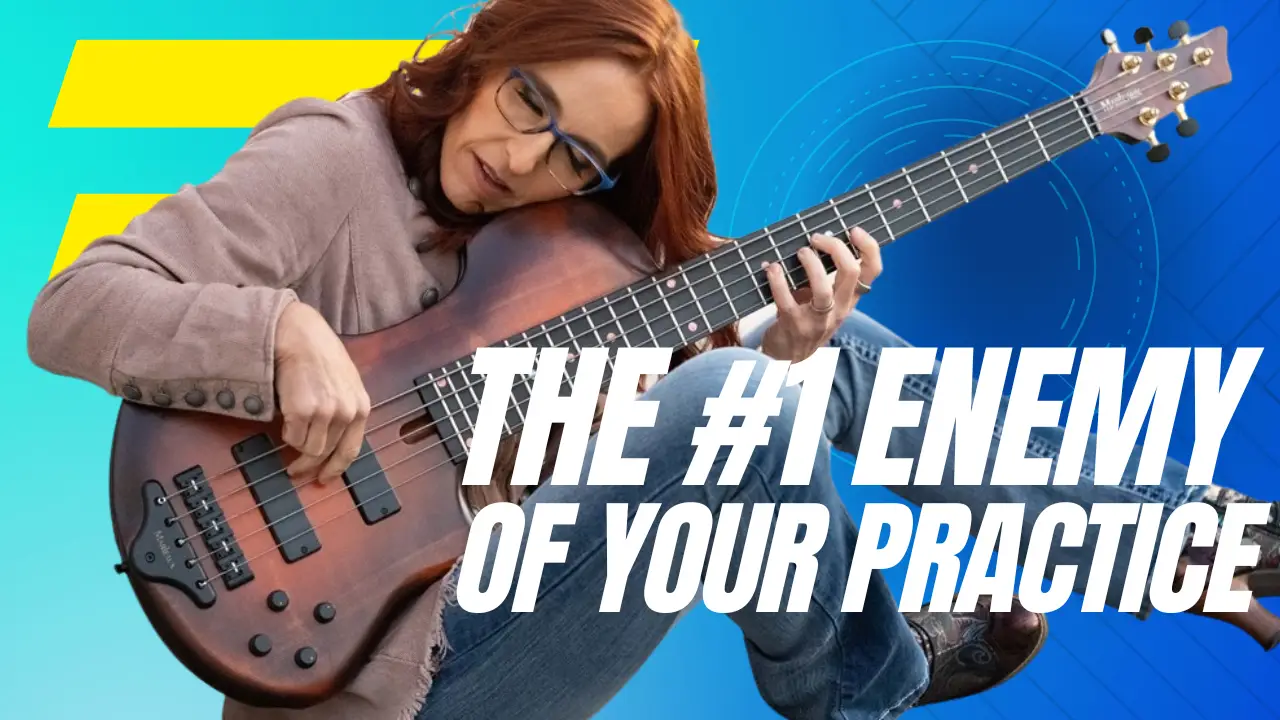Watch, as I unveil the #1 enemy that’s holding back your progress and growth as a bassist. As an experienced bass player and educator, I’ve encountered this obstacle countless times, and I’m here now to share my insights and tips with you.
Together, we’ll explore practical strategies to conquer this challenge and unlock your full potential on the bass. Get ready to elevate your playing and overcome the hurdles that have been holding you back. Join me in this transformative journey and let’s revolutionize your bass practice routine together!
#A14
The #1 Enemy of Your Bass Practice
Video Transcript
No, it’s not the wrong strings; it’s not the wrong bass; it’s not the wrong amp; it’s not on YouTube either.
The Problem
After observing hundreds of students and bass players, I can tell you what I think the biggest enemy is, it’s distraction. Notifications, email, texts, adverts: play like Jaco in a weekend, advertising. Seriously, if you’d like to learn more about why these kind of distractions are so destructive, I recommend this book. The link is in the description.
Our attention span has taken a nosedive due to technology – the never-ending scroll, constant novelty, video-video-video! They know exactly what they’re doing and the goal is to keep you on these platforms as much as possible. We suffer decision fatigue from all these hyperlinks, so it’s tempting that as soon as the going gets just a little tough, we jump from one thing to the next, to the next, to the next.
Many of us have lost the ability to deeply focus and get into the flow. The flow is such a delicious feeling. It’s deeply healthy to practice and get lost in notes and improvisations – in sounds and technique and reading. It is such a delicious feeling when you feel yourself improved as a result of it.
So, how can we get the focus back? Trying to force focus doesn’t work very well. Instead, what does work is finding purpose in the task. Being in the process of the task helps. This reminds me of what we do when we meditate and observe our breath, enjoying the task.
I have four suggestions for you
1 – Deep practice. It is also called deliberate practice. This comes from this book. Instead of putting in quantity time when you practice, focus on quality time. My PORA method described in my book, Music Theory for the Bass Player is a five-step sequence that can help you achieve deep practice. So, number one is deep practice or deliberate practice.
2 – Small bite-sized chunks. Short videos are a great way of going about doing that. All you gotta do is press play and practice along. It’s just like watching a workout video where you exercise along with it.
3 – Support. Group support can take many forms: coaches, peers practicing and learning together, maybe even a local lesson.This works really well for some, and
4 – Feedback. Feedback from a teacher and from yourself through recording.
Hope that was useful. These were just a few tips on how you can get your attention and focus back. Our programs touch on all of these. We’re big on community and we’re big on feedback.
Here’s tip to make your Practice More Effective!

